What is advocacy and why is it so important for creating resilient food systems?
15 December 2022
Project Name
Sustainable Land and Water Management Project (SLWMP)
GEF Implementing Agency
World Bank
Objective
To improve food security in Northern Ghana using an ecosystem approach that builds on the existing systems and capacities developed through the SLWMP.
Project Targets
land under integrated and sustainable management
GHG emissions avoided or reduced
beneficiary households
In Ghana, the agricultural sector is the largest source of employment and is dominated by smallholder farmers. Less than one percent of cultivated land is irrigated, making agricultural yields highly dependent on rainfall. Although the south of the country experiences two rainy seasons, Northern Ghana, like its neighbouring Sahelian countries, experiences long periods of drought and increasingly erratic rainfall patterns as a result of climate change. There is also a growing divide between those living in the urban areas of the south, where poverty and hunger have been reduced, and those living in the north, where households experience high levels of poverty and food insecurity and have limited access to economic opportunities.
The RFS Ghana project, SLWMP, supports a comprehensive landscape approach to sustainable land and watershed management in Northern Ghana, with planning activities targeted at management of ecosystems at the landscape level, and improved food security and poverty reduction at the community level. The project builds on previous GEF investments in the region, which have benefited over 24,000 people, and helped to reinforce national capacities in spatial planning and implement local platforms at watershed and community levels.
The project aims to generate triple-win situations that combine agricultural productivity enhancement of ecosystem services and improvements of livelihoods, incomes, and food security.
The project is structured around three principal components:
The project aims to meet the following targets:
Capacity for integrated spatial planning is developed.
Sustainable land and water management interventions are implemented.
An effective and functional knowledge management, learning, and monitoring and assessment system is established.
The project is implemented by the Ministry of Environment, Science, Technology and Innovation (the project coordinating entity) together with the Ministry of Food and Agriculture, the Environmental Protection Agency, the Wildlife Division, and the Forest Services Division of the Forestry Commission. At the national level, the project engages the National Sustainable Land Management Committee, which is responsible for providing overall guidance for implementation of the Ghana Strategic Investment Framework for SLM funded through the TerrAfrica Program.
Each RFS country project conducts activities that fall under common thematic areas within the programme. Explore each project theme relevant to the RFS Ghana country project below to see which activities are being implemented under each theme.
Stories from the Field
Explore our stories from the field to learn more about the activities, milestones, lessons learned, and achievements of the RFS Ghana project.
Relevant Resources
We have a growing library of reports, briefs, case studies, media, tools and guidelines. Explore all resources related to the RFS Ghana project to get greater insight into our programme activities.
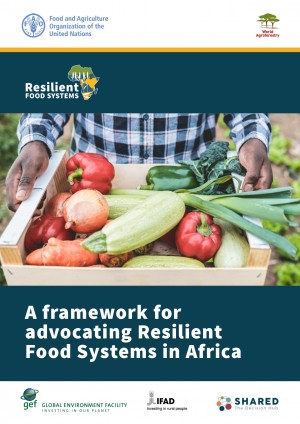
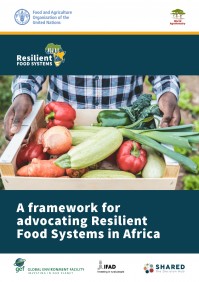
This framework aims to deepen the understanding of country teams to clarify their engagement in leveraging policy, institutional and behavioural change for achieving positive policy, institutional and human behavioural changes necessary to meet resilient food systems objectives. It provides an outline of the fundamental elements in the design and implementation of an advocacy strategy including understanding decision cycles and influence for sustainable land management and agroecological systems; shares experiences reflecting different scales of intervention (national, sub-national, local); and provides examples of how different mechanisms such as multi-stakeholder platforms can be used as an engine of socio-ecological change.
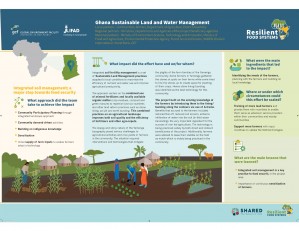
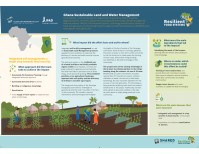
The 2022 Resilient Food Systems Knowledge Exchange and Learning Workshop included an interactive experience-sharing wall, featuring impact posters across RFS countries and components of the Regional Hub.
This poster was prepared by the Ghana Sustainable Land and Water Management project.
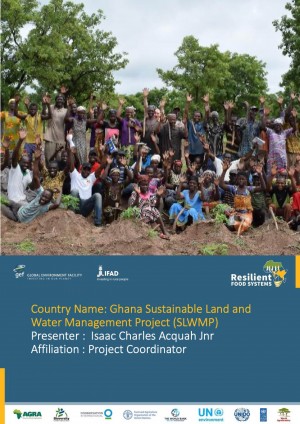
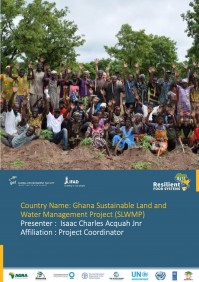
The RFS Ghana project is improving food security in Northern Ghana using an ecosystem approach that builds on existing systems and capacities. During the 2021 country roundtable, Project Coordinator Isaac Charles Acquah Jr provided an update on the project’s activities, achievements, challenges and lessons learned. The presentation was followed by facilitated Q&A session to allow country project and RFS partners a chance to exchange information and learn more about RFS activities in Ghana.